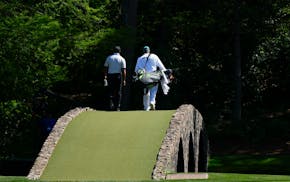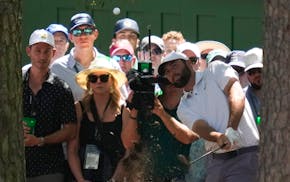Joe Mauer will jog to home plate to catch the first pitch Thursday evening on another temperate night at Target Field, and all will seem to be right in his world.
At 27, he is the reigning American League Most Valuable Player. He just returned on a private flight from his fourth All-Star game, and the first in which he led all players in votes. Four months after signing the richest contract in franchise history, he remains the favorite son in a stunning new ballpark in his home state, and he spent the winter being feted and flattered by the likes of ESPN and Sony while starring in milk advertisements with his mom, one of the many family members who watches him play in person.
He would seem to be living the most perfect life imaginable if it weren't for all those people keeping score.
Ignore the heartwarming story arc and stare at the numbers long enough, and what you find is not a summer of realized dreams, but a study in psychology, physiology and even architecture that raises questions about Mauer's worth.
Even in his current battered and glum state -- has someone of his stature ever looked more weary at an All-Star game? -- he remains an elite catcher. But while he so recently stood as the symbol of an ascending franchise, today Mauer's performance is problematic and worrisome.
At this moment, he is a very good player who is being paid and treated like a superstar.
The Twins need more from their franchise player, and yet the physical demands of his position, the dynamics of the new ballpark and the inevitable decline following a once-in-a-lifetime season have seemingly sapped his power and enthusiasm.
Four months into an eight-year, $184 million deal, Mauer, the No. 3 hitter on a contender, ranks 121st in the majors in RBI, behind the likes of Denard Span, Ian Desmond and Kurt Suzuki.
He ranks 91st in slugging percentage, behind the likes of Juan Uribe, Michael Cuddyer and Placido Polanco.
Even in the statistical category he should dominate, on-base percentage, he ranks 47th, behind Colby Rasmus.
His at least momentary decline can be explained by several phenomena:
The ballpark effect
Target Field promised to be a haven for lefthanded hitters, but wind currents and Mauer's inside-out swing have left him grimacing after watching line drive after line drive die on the warning track. If he had taken the same swings in Fenway Park, his batting average and slugging percentage might be markedly higher, but that is little solace to a team that is paying him to produce regardless of his surroundings.
The scouting effect
Opposing teams have learned how to defend Mauer, and Mauer has refused to alter his approach. Most of his hardest-hit outs are ground balls to a shortstop playing up the middle or line drives and long flies to the left fielder. When Mauer was at his best last season, he was capable of pulling the ball with power; he has not shown an ability to do so this season.
Last year, he hit a career-high 28 homers. This year he has four, and none at Target Field.
The position effect
In 2009, Mauer missed all of April with an injury and then looked fresh and strong the rest of the season. This year Mauer has looked weary since he started answering questions about his contract negotiations this spring. Mauer is unwilling to use his bruises and strains as excuses for his lack of production, but it is obvious that he is battered.
If top catching prospect Wilson Ramos were performing well, the Twins might be considering whether to play Mauer more often at DH or another position to save his body. As it is, the Twins may have to revisit the idea of moving Mauer to another position this winter if he continues to play hurt, even though changing his position would make him less unique and valuable.
The contract effect
After signing a record contract before the 1993 season, Kirby Puckett's production fell off. This is human nature -- athletes surge when a huge contract is on the horizon, and often slump the next year while dealing with the pressures of that contract. As impervious as Mauer has always seemed to pressure, he has followed the same pattern.
What is most admirable about Mauer is what is most troubling: There is no doubt he is giving the Twins everything he has.
No one works harder or longer at preparing himself for each game. No one is more single-minded during a season.
The Twins need more from their franchise player, but he might not, at the moment, have much more to give.
Jim Souhan can be heard at 10-noon Sunday on AM-1500. His Twitter name is SouhanStrib. • jsouhan@startribune.com

Souhan: Why Tiger Woods should keep swinging
Souhan: Scheffler wins Masters again, shows what makes him special
Morikawa falters in final round at Masters

Keeping up with the Joneses who helped design Augusta National's classic back nine


